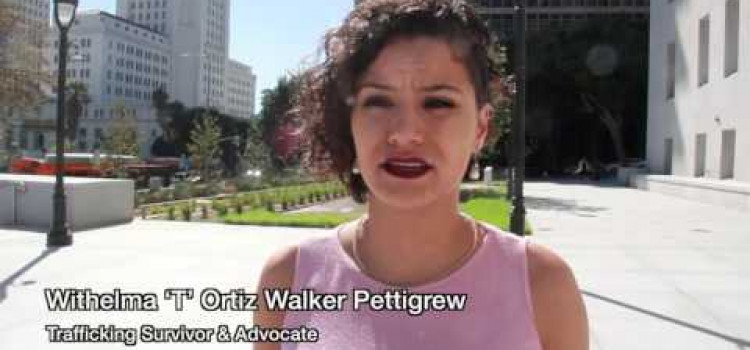

Jessica was only 11 when she was first trafficked for sex. Now 30 and an advocate for trafficking survivors, she has shared her story numerous times with the media, asking only that they not refer to her in their reporting as a “child prostitute.”
“I say to them, please do not refer to me as an ex-teen prostitute,” said Jessica, who asked that we not use her last name. Sure enough, the stories inevitably do just that.
“Words hurt,” she said, explaining such terms feed into negative perceptions of commercially, sexually exploited children (CSEC) that then shape attitudes and policy.
Jessica was speaking at an event in downtown Los Angeles last week marking the launch of the #NoSuchThing campaign, which is seeking to end the criminalization of trafficked children in Los Angeles. Laws on the books in all 50 states currently treat minors as sex workers.
Organizers of Wednesday’s event, held at the Hall of Justice in downtown Los Angeles, are also pushing to end the use of terms like child prostitute, child sex worker or underage prostitute, which they say wrongfully suggest that a minor is capable of consenting to sell sex with an adult.
“The use of [such terms] implies consent, criminality,” said Malika Saada Saar, director of The Human Rights Project for Girls (Rights4Girls), a key lead in the campaign. Saada Saar noted that as underage children these minors cannot give consent, meaning they should rightly be seen by law enforcement and the public as victims of rape.

LA County Sheriff Jim McDonnell, who told reporters that his department would no longer arrest child victims of sex trafficking, connecting them to service providers instead.
Speaking at the event alongside advocates and survivors was Los Angeles County Sheriff Jim McDonnell, who told reporters that his department would no longer arrest child victims of sex trafficking, connecting them to service providers instead.
In a letter to employees, McDonnell said he told staff to stop using the term child prostitute. “They are child victims and survivors of rape,” McDonnell’s statement read. “We must remember that children cannot consent to sex under any circumstance.”
African-American children are particularly affected by the criminalization of commercial rape victims. In Los Angeles, 92 percent of minors arrested for “prostitution” are African-American girls, Saada Saar said.
“These kids, our kids, are denied the protected status of victim … despite the fact that they have experienced one of the worst forms of abuse and violence,” Saar said.
Withelma ‘T’ Ortiz Walker Pettigrew, a trafficking survivor who spoke at the event, agreed. “That (term) keeps victims wrapped up in shame and trauma,” she said.
Pettigrew is among those circulating an online petition to get the Associated Press (A.P.) to abandon use of such terms. The A.P. style guide is widely used as a reference for proper terminology by major and small news sources. The Change.org petition currently has more than 90,000 signatures.
“I am a sex trafficking survivor who suffered lifelong stigmatization because of that very same damning label,” wrote one signatory to the petition.
An AP report filed shortly after the briefing did use “child prostitute” in the headline, prompting Rights4Girls to tweet: “Shameful the @AP continues 2 use this term despite 90,000+ people urging them to stop #NoSuchThing #RespectSurvivors.”
“You mean RAPE VICTIMS. Quit perpetuating #RapeCulture, @AP,” another tweeted.
Every year in the U.S., more than a thousand children are arrested for prostitution. Last year in California, 174 CSEC children were arrested, according to Saar.
But law enforcement agencies, including the Long Beach Police Department, have taken steps in recent years to decriminalize child trafficking vicitms.
LBPD was among the first to adopt the First Responder Protocol for CSEC, a pilot program that has law enforcement sending detained CSEC victims to multi-agency services, including mental health providers, and nonprofit advocacy groups like Saving Innocence, where survivors work as mentors.
Before the First Responder Protocol, trafficked minors were routinely arrested, something advocates say compounded their trauma, fomented distrust of law enforcement and made many vulnerable to being re-trafficked.
Last week the LA County Board of Supervisors passed a motion urging more county law enforcement agencies to adopt the First Responder Protocol.
“Now we’re listening to the real experts … and the children themselves who have spoken,” said Supervisor Sheila Kuehl at Wednesday’s press conference.
Supervisor Mark Ridley-Thomas said there is retraining happening across the county to implement these changes.
But of course, challenges remain.
“A majority of our girls would tell you, their buyers are never held accountable,” said Kim Biddle, CEO of Saving Innocence.
She pointed to one of her CSEC clients, who was 13 when she was arrested after officers discovered her having sex with an older john, who was merely given a citation for solicitation.
“Johns are rapists,” Biddle said, adding that buyers should be tried as such, not just solicitors.
Organizers say they plan to take the #NoSuchThing campaign national.
“We’re going to bring this to Texas,” said Kathyrn Grinan, who works with Harris County Sheriff’s Office in Houston, which she says is ground zero for sex trafficking nationwide.
Here in Los Angeles, they’re also working to get the message out to the wider public.
Across swaths of freeway crisscrossing Compton and Long Beach, drivers now see digital billboards depicting the face of a young child over the campaign’s banner, “There is No Such Thing.”
For more info on what local police departments, like Long Beach, are doing to change the narrative, go HERE.
